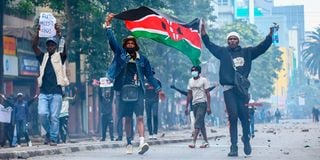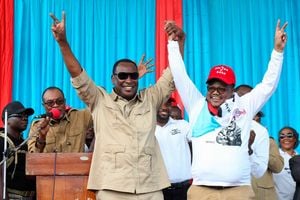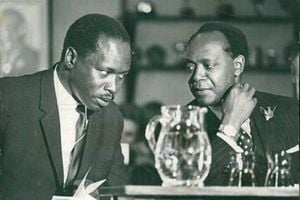
Anti-government protesters hold up the Kenyan flag along Tom Mboya Street on July 2, 2024 during the Occupy Everywhere protests.
On the International Day of Democracy, observed on September 15, I reflect on the emerging opportunities for democratic resilience in Africa amidst obvious reversals of many democratic ethos and indices of open societies in recent time.
Democracy is built on the foundation of equity, equality and fairness and above all on the will of the people. Unfortunately, recent events, especially in the last decade, have seen a systematic domination of the elite over the masses. There has also been institutionalised exclusion of the greater number of the citizenry, especially women and youths, from the influence on and outcomes of important decisions which is evident in the levels of political inequality and elite capture of the state.
Many actors are anxious about the state of democracy globally but especially in the global south. Some academics, politicians, and civil society activists see the rise in economic inequality, dissatisfaction with democracy’s outputs and threats to civil liberties, along with the growing popularity of far-right populism, as red flags on what might be the reversal of the trajectory towards open societies — from consolidated democracy back to consolidated autocracy.
In reflecting on the state of democracy and good governance in Africa over the decades, it has provided more opportunity for economic transformation, self-actualisation and development despite the setbacks. It has elevated African countries to veritable players in world politics due to its global acceptability and therefore considered a more beneficial form of governance across the continent. However, there are criticisms on the form and practice of western liberal democracy given the strong influence of the West in shaping the democratic reforms and agenda across the continent from the late 1990s. The central issue in the discourse on democracy in Africa is whether the adopted western liberal democracy is feasible in Africa considering the Continent’s socio cultural and economic peculiarities which continue to undermine its ability to actualise the dividends of democracy while fostering autocratic and repressive regimes that sometimes catalyse the military’s interest into unconstitutional change of government.
Experts indicate that the current state of democracy on the continent tilts towards a hybrid of autocracy and democracy leading to anocracy (semi-democracy). Irrespective of the lack of consensus on a universal conceptual understanding of what model of democracy is most appropriate for the continent, there is a convergent agreement that democracy must comprise key yardsticks as a good governance approach relevant for the development of the continent. This is exemplified in the interlinkage between democracy and good governance as mutually reinforcing with imbued parameters such as constitutional order, political practice that provide for inclusive representation, participation and accountability through regular competitive elections held under conditions of civil and political liberties guaranteed by the rule of law.
It recognises individual rights and liberties of expression, association, belief and participation. The belief is that once these conditions are present, it will become the foundation to build a self-regulating governance architecture in Africa which responds to citizen’s needs, assure social justice, appropriate management of the economy, sustainable peace and security as well as the promotion of favourable environment for all individual pursuit.
Demographically, Africa is regarded as the world’s youngest continent with almost 60 per cent of its population under the age of 25. In line with the definition of a youth under African Youth Charter of 2006 as between the ages of 15 to 35 years, 77 per cent of the entire population in Africa is below 35 years. By 2050, it is estimated that two in every five children in the world will be from Africa. According to demographers, Africa faces a youth bulge which underscores the importance of youth politics in the continent. The fact that youths were a significant force in politics is evidenced by their contribution to the political struggles for independence in pre-colonial Africa as well as their contribution to the anti-apartheid struggle of South Africa.
Despite this recognition, African youth’s influence on contemporary national politics remains limited. It is generally believed that this marginalisation and exclusion is a key reason young people are mobilised into violent activities during elections. There is a general sense that the democratic and governance structures in the continent discourage young people’s participation in the political process. Rather, youths have become conduits for political violence through their deliberate recruitment by political actors to actualise political interests as thugs, members of vigilante groups or militia wings of political parties.
However, recent developments across Africa have shown that young people are using their comparative advantage of numbers to find innovate ways to change the narrative and their role in democracy and governance in the Continent. Typical examples include the 2011 Jasmine revolution in Tunisia which ignited the Arab Spring in the North Africa and the Middle East. Through civil disobedience and demonstrations, youths were able to trigger a wider political and governance reforms against security force brutality, government corruption and economic depression. Their efforts have yielded a democratic wave in the region.
What these examples provide is that when young people commit to mobilise around a political objective, it strongly influences the policies and decisions relevant to address their interest. Their majority population gives them the leverage and power of negotiation to participate in democratic processes.
This International Day of Democracy, we are reminded of the ideals of political equality, in which opportunities and outcomes of political decisions are in law and practice equal across the public. The citizenry and their advocates in civil society push for a normative definition of democracy as a contested political landscape where policy decisions should closely resemble citizen preferences. The puzzle of political inequality arises precisely because, in reality, democracies are de jure but not de facto regimes of equality.
Dr Chukwuemeka B. Eze is Director, Democratic Resilience in Africa Program, Open Society Foundations






